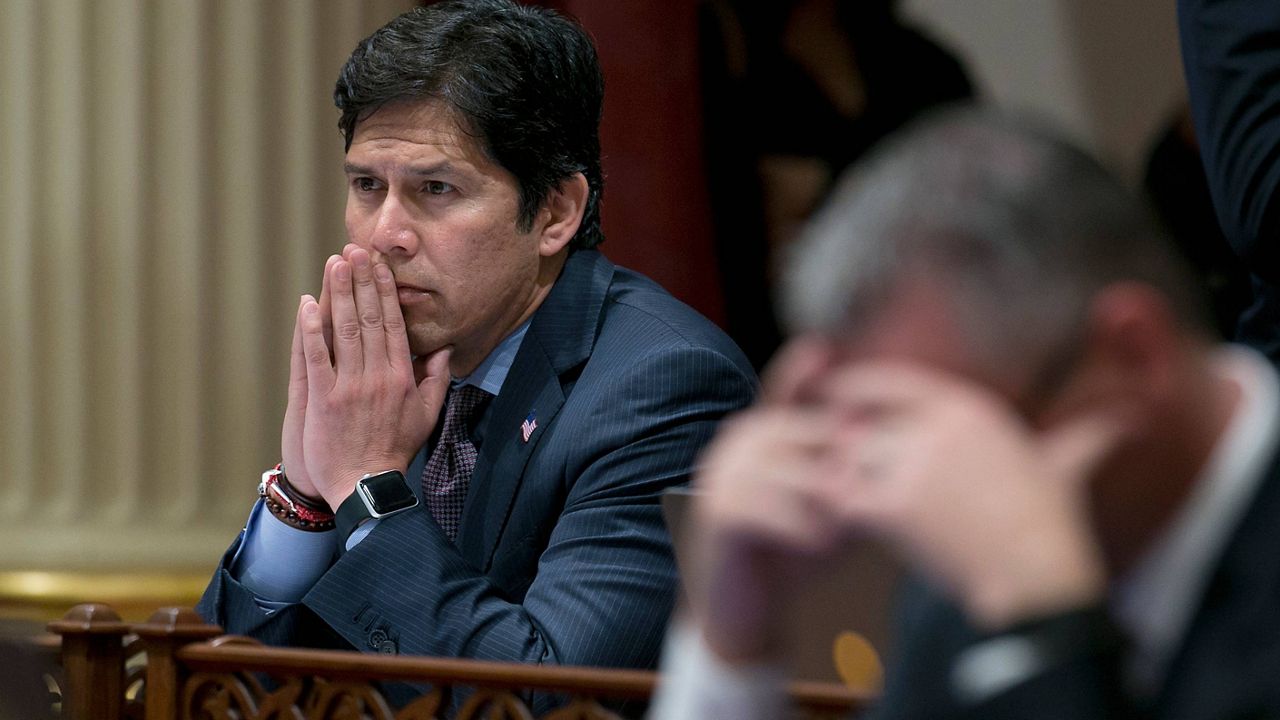LOS ANGELES (CNS) — The Los Angeles City Council’s Ad Hoc Committee on City Governance Reform heard feedback over an item on potential consequences for censured council members during its first meeting Thursday.
What You Need To Know
- The council voted unanimously to censure Kevin de León, Gil Cedillo and Nury Martinez over their participation in a racist 2021 conversation that was leaked in October
- Martinez resigned shortly after the leak, but de León and Cedillo have defied widespread calls to step down
- An October motion suggested exploring limiting a censured council member’s access to use discretionary funds and authorize contracts, restricting their participation in council committees and limiting their ability to introduce certain types of motions
- De León, who makes over $8,000 biweekly, has continued to earn his salary despite not attending a council meeting since Oct. 11
The council voted unanimously to censure Kevin de León, Gil Cedillo and Nury Martinez over their participation in a racist 2021 conversation that was leaked in October. Martinez resigned shortly after the leak, but de León and Cedillo have defied widespread calls to step down. Cedillo’s term ends in a few days, but de León’s runs until 2024 and he has remained steadfast in staying in office.
The ad hoc committee was established in response to the ensuing scandal, and seeks to address potential systemic reforms to issues such as redistricting, campaign finance and the power of the council presidency.
The City Charter does not indicate any penalties that can result from censuring a member. An October motion by Council President Paul Krekorian and Councilman Marqueece Harris-Dawson — both of whom sit on the ad hoc committee — suggested exploring limiting a censured council member’s access to use discretionary funds and authorize contracts, restricting their participation in council committees and limiting their ability to introduce certain types of motions.
Another potential repercussion could be prohibiting censured members from sending mass communication mailers to residents using city funds.
Some of de León’s constituents have posted pictures on social media of mailers they received from the councilman, inviting them to a holiday tree lighting, without a disclaimer that he had paid for mailing them out. Harris-Dawson’s motion to request information on that potential penalty passed 4-0 in the committee.
Councilwoman Monica Rodriguez, who is not on the committee, submitted a letter calling the item “neither responsible nor necessary.” She warned that cutting discretionary funding and contract services for censured members could have unintended consequences by punishing constituents, local businesses and community organizations.
Limiting de León’s funding for his district could result in a “substantial impact on over 185 organizations and 260,000 constituents,” according to Rodriguez. She said that includes $600,000 for cleaning crews, $600,000 in special event rentals for schools and seniors, $200,000 for community organizations, $129,000 for over 5,000 turkeys for Thanksgiving and $100,000 in food giveaways to Boyle Heights families.
Rodriguez sought for the committee to delay the motion and “not impetuously move toward making decisions.”
“The approval of this motion would cause instant collateral damage and unjust denials of vested services to many economically vulnerable people outside your districts,” wrote Rodriguez, who added that the majority of the population in de León’s district consists of working-class Latinos.
Rodriguez, later addressing the committee during the meeting, stressed that she was “disgusted” and “disappointed about reprehensible acts of colleagues.”
“The acts are indefensible, but they’re not illegal,” Rodriguez said.
She cautioned against the council trying to “extrapolate more than what our power affords us in these positions.”
“I also believe in making sure that no constituency suffers through being obstructed from services, from being withheld the resources and representation that they are afforded by having an elected member,” Rodriguez said.
Rodriguez was also the lone dissenter on the vote to establish the committee. She told City News Service last month that she didn’t believe the council has the credibility to reform itself, calling the committee a “ruse to reform” and instead seeking an independent body.
The committee also heard from Jennifer Barraza, de León’s chief of staff. Barraza did not address de León’s refusal to resign nor his absence from council meetings for nearly two months, but called the motion seeking censureship consequences an “attempt to disempower a majority Latino district.”
“This vote doesn’t help people,” Barraza said. “Those people that work hard, sometimes two or three jobs to pay our salaries, are watching today, and they depend on you to make the right decision and not move this motion forward.”
De León, who makes over $8,000 biweekly, has continued to earn his salary despite not attending a council meeting since Oct. 11.
Krekorian, the committee chair, stressed that the motion only starts the discussion about whether repercussions for censured council members are appropriate.
“And if so, what should those repercussions be and how do we strike the balance between taking actions that will be appropriate for the misconduct of a member — without doing things that will harm the constituents that member represents?” Krekorian said.



